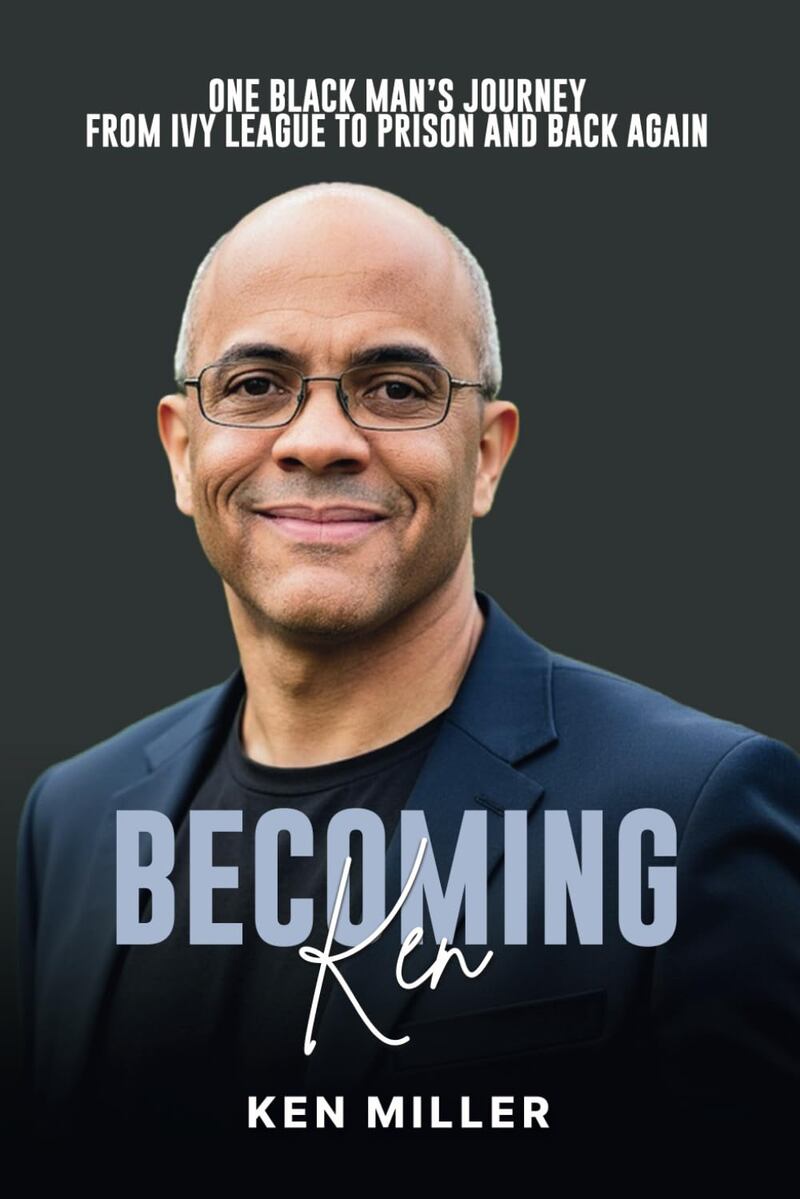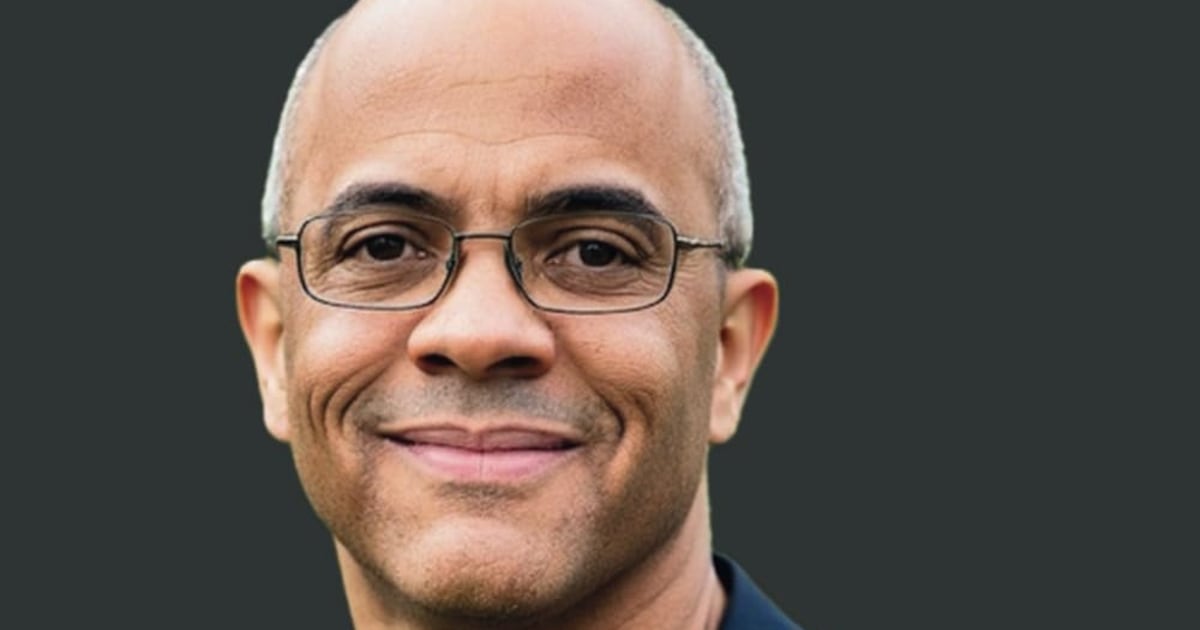“Becoming Ken: One Black Man’s Journey from Ivy League to Prison and Back Again”

By Ken Miller; Thought Leaders Press, 2025; 286 pages; $24.
“How did I, an Ivy League graduate from Dartmouth, become a crack-addicted drifter sleeping in a closet,” author Ken Miller asks in the opening pages of his memoir. Getting arrested in that cockroach-infested utility closet in a dilapidated Reno boarding house doesn’t sound like the springboard for redemption from a quarter-century maelstrom of substance abuse, crime and self-destruction on levels all but impossible to imagine. But it was.
How Miller survived and emerged from someplace far below rock bottom is what readers will discover in his bracingly honest and utterly compelling book, “Becoming Ken: One Black Man’s Journey from Ivy League to Prison and Back Again.”
Miller, founder and president of Anchorage fundraising and grant consulting company Denali FSP, tells his story in plainspoken language. It’s an account of his meteoric fall from seemingly unlimited potential to addiction, desperation, homelessness and degradation, followed by redemption. He offers it as both a warning of what can happen to a person regardless of their circumstances, and as an instruction manual for others on how to overcome their own setbacks, large or small. On one level, it’s a self-help book, but the tips offered at the end of each chapter are brief. It’s in the excruciating experiences that he details here that the real lessons lie.
Miller’s narrative begins in struggle. He was born to an unknown Black father and white mother — he would meet the latter near the end of her life — and surrendered to the state of New York. He was adopted from foster care at age 5 by a mother who loved him unconditionally and for life, and a violent alcoholic father.
Despite this rocky beginning, Miller excelled in school, which he attended in Anchorage after his mother brought him north. In 1980, his grades got him accepted at Dartmouth, but his bundle of insecurities, fears, questions about his racial identity and longing for acceptance went with him. And in a social atmosphere dominated by white kids from wealthy families, his background set him apart.
Having witnessed the example of his father, Miller abstained from alcohol and drugs throughout his school years. But at Dartmouth, seeking acceptance and escape, he began drinking. Drugs soon followed. Especially cocaine, his drug of choice. Blackouts became a norm. His behavior toward himself and others descended into an abyss. His grades suffered and he barely coughed his way through.
After returning to Anchorage, he began a teeter-tottering between abuse and recovery programs, which he made limited efforts at succeeding in. He and his mother moved to Seattle in 1988, where underemployment became his norm and his energies went toward sustaining his increasing voraciousness for drugs and booze. A home provided for him at the city’s Mount Zion Baptist Church became a crack house. His unreliability cost him jobs. He made one last stand in a friend’s apartment, but betrayed that trust as well.
In the ensuing chapters, we follow Miller through various missions and onto the streets. He drifts from Alaska to California, to Reno, Nevada, and then to Mississippi. A brief jail term brings an equally brief respite of sobriety, but upon release he relapses immediately.
As his rapid fall continues, Miller turns to crime, working as a crack dealer, prostitute, pimp and more. A failed marriage brings guilt and a sense of failure from which he attempts escape through further drug use.
Returning to Reno, he burglarizes his mother’s home despite her repeated efforts at rescuing him. She drops the charges, but because of his previous conviction, a failed drug test sends him behind bars once again.
Miller served his time, kept out of trouble and made parole. But he didn’t reform. Upon release he sought to establish himself as a drug kingpin. But as the warning cautions, he got high on his own supply. His dream business never left the ground. Soon he was panhandling instead.
His third arrest and conviction came in 2004, and this time he was finally ready to change. Miller treats his time in prison as a source of redemption. He slowly began breaking the bonds he had wrapped himself within since childhood.
Focusing on physical and mental health, he exercised daily and read books relentlessly. And when he was let back out, he immediately sought help, joining support groups and finding mentors, eventually becoming one himself. He stared down the demons that had led him along such a horrific road and quit blinking.
“The more I faced what I had avoided — debts, regrets, broken connections — the more I discovered that my biggest enemy was never someone else’s judgement,” he writes. “It was the lie that I wasn’t worthy of healing, of success, of closure. One by one, I’m learning to silence that voice and step boldly into every room that once had me trembling outside the door.”
Some of the lessons found in this book are macabre. Lessons most of us will fortunately not need to learn for ourselves, especially as Miller outlines their results. How to optimize panhandling. How to become an unsuccessful drug dealer. How to behave in prison.
But he also shows us how to dig oneself out of what can understandably be viewed as a bottomless hole. In his introduction, Miller writes that he hopes any reader, regardless of their struggles, will find hope and guidance in his own transformation.
Miller returned to Anchorage, where he worked at the Dena’ina Civic and Convention Center and was wildly successful spearheading fundraising for Bean’s Cafe, the local soup kitchen. He parlayed his new skills, coupled with business acumen he had ironically acquired through drug dealing, and founded Denali FSP in 2014. He’s now a respected community leader and mentor to young Black men.
Placing the word “journey” in the subtitle is, put mildly, an understatement. Miller’s story is an odyssey. One all of us should hope to avoid. But in sharing it, he gives readers cause to believe that they too can transcend the worst. This is quite a book.
[For a different outlook on ‘prepping,’ Bill Fulton and Jeanne Devon collaborate again on new book]
